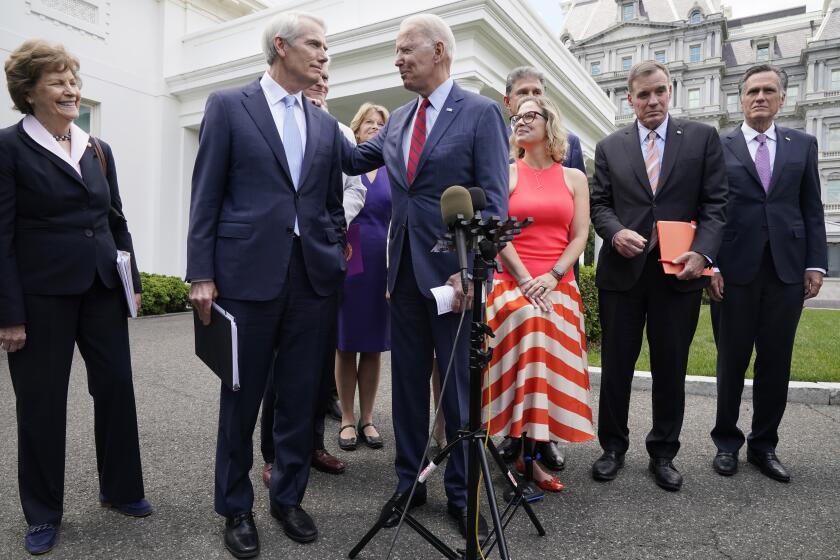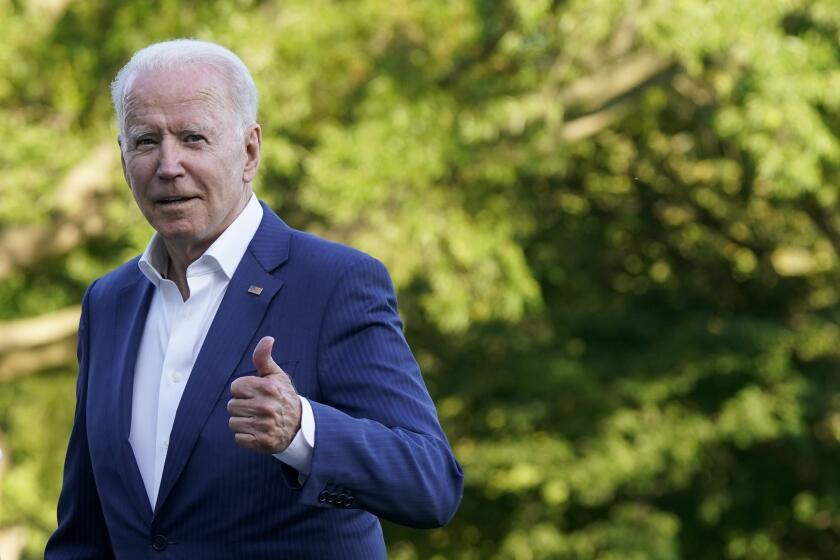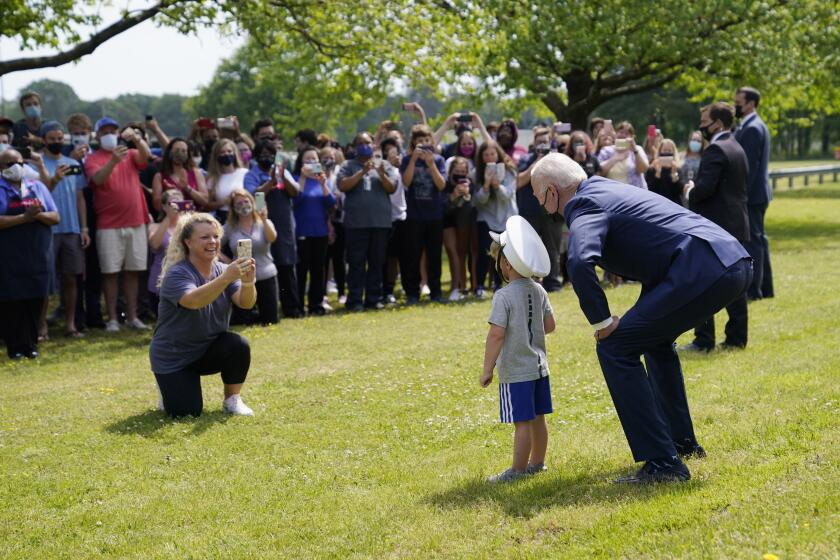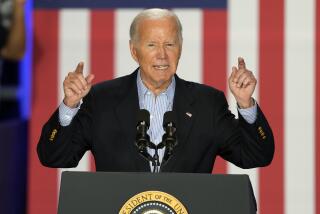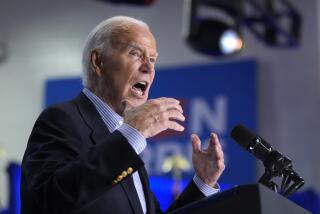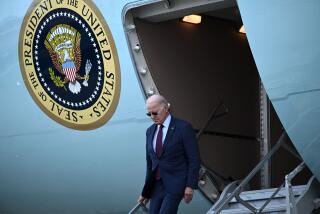Man on a wire: Biden’s balancing of bipartisanship and Democrats’ demands tests his presidency
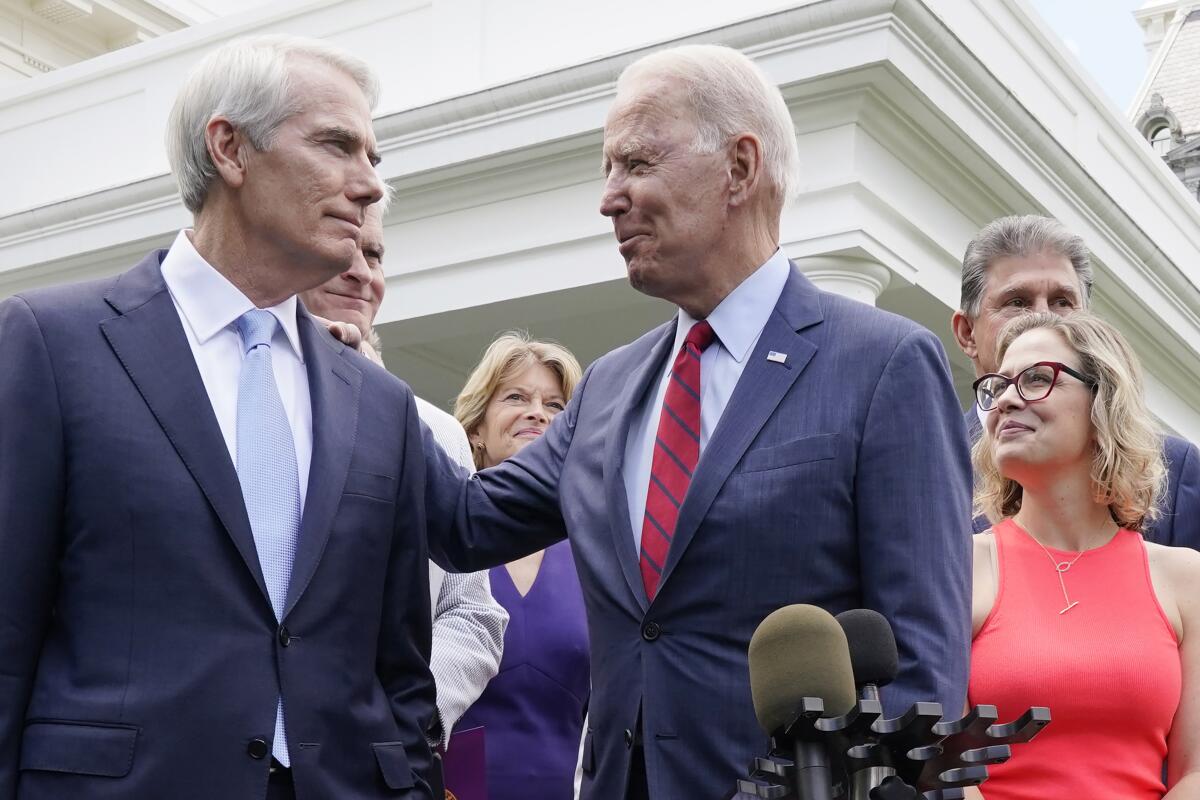
- Share via
WASHINGTON — When Joe Biden was running for the Democratic presidential nomination in 2020, his rivals disparaged the nearly half-century Washington veteran as a man of another era. Five months into his presidency, it is hard to imagine any Democrat better able to walk the political tightrope between the White House and Capitol Hill.
Biden has needed every bit of his experience, policy expertise and personal connections to pursue an audacious two-track approach to advancing his legislative agenda, negotiating with Republicans while holding his party together in a Congress that Democrats barely control.
It’s not clear that Biden will keep his footing. His strategy for advancing both a bipartisan infrastructure bill and a sweeping package of progressive policies that Republicans have vowed to oppose — including family assistance and climate change measures — may collapse, leaving him and his party empty-handed as they head into next year’s midterm election.
The maneuvering in the coming weeks and months will test not just Biden’s legislative agility but also a central premise of his surprisingly ambitious presidency: that both sweeping policy reforms and bipartisanship are vital and achievable in the world’s leading democracy.
“A lot is riding on this,” said Maurice Mitchell, national director of the progressive Working Families Party and a skeptic of Biden’s talk of compromise with Republicans. “He’s putting his reputation as a deal maker, as someone who understands the Senate, and his stated goal of being a transformative president — he’s putting it all on the line with this strategy.”
The $1-trillion infrastructure deal, if successfully enacted, would mark the first major bipartisan legislative accomplishment for Biden.
It is a perilous path for a politician who, by his own description, is a transitional leader of a party increasingly shaped by a younger generation that is more progressive and confrontational.
Biden has been more responsive to the left than many in both parties expected, but he’s resisted pressure on a number of fronts. He has not taken up progressives’ call to end or curb the filibuster, even as Republicans use it to obstruct his agenda. He has been criticized for not doing more to fight for a major voting rights bill that Republicans killed in the Senate last month.
Yet even Democrats to his left say Biden’s hands have been tied in part by circumstances: Voters wanted to oust President Trump but gave Democrats narrow House and Senate majorities, limiting their ambitions. Given that, his skills are well matched to the moment.
“I’ve not historically been a Biden guy, but I’m astonished about how well he is doing,” said former Vermont Gov. Howard Dean, a progressive former party chair who remained neutral during Democrats’ 2020 presidential nomination race. “It’s not like he ran a great campaign, but he was the right guy for the time. He’s shown that during the first six months. What we thought were going to be his liabilities have turned into huge assets.”
With only a small faction of Republican moderates willing to work with Biden, he is making scant headway on his promise to restore some trust between the parties. Even the infrastructure agreement with 10 GOP senators, the most significant accomplishment so far for Biden the deal maker, was nearly undone by Biden the gaffe maker.
The president suggested he’d veto an infrastructure bill if it was not accompanied by a measure with the progressive policies. He quickly walked back his comments and regained the support of Republicans involved in the deal. But for many other Republicans, it was more evidence that Biden’s instincts for compromise are hemmed in by his party’s left wing.
“I think we are back on track, but what that did is it greatly weakened our Republican support,” Sen. Susan Collins of Maine, a GOP negotiator, said in an interview. “Now they are very mistrustful. I would not underestimate the harm that was caused, even if it was inadvertent.”
Biden’s statement Saturday retreating from a threat to hold an infrastructure deal hostage to a bigger bill has left progressives fretting.
In just his first five months as president, Biden has shown a flexibility to deploy different approaches to leadership.
He was able to act largely on his own to achieve what is arguably his biggest accomplishment to date: significant progress in the fight against the COVID-19 pandemic. He moved quickly on game-changing economic policies with only Democrats’ votes by enacting a $1.9-trillion COVID-19 relief package. And he searched for compromise when possible, notably on the infrastructure plan that fell far short of his original proposal.
The actions reflect the mixed images of himself that Biden projected as he sought the presidency: He boasted of being a pragmatist, more moderate than his Democratic rivals, yet as a party nominee, he proposed more far-reaching progressive policies than any of his predecessors.
As president, he defied the expectations of those who believed his centrist, deal-making instincts would dominate when he signed the COVID-19 relief package into law in March without having made substantial concessions and without Republican support.
The go-big strategy was a product of a lesson Biden and his aides drew from their experience in the Obama administration, watching President Obama’s early economic and health initiatives get delayed and watered down in a nearly fruitless effort to gain Republican support, hurting Democrats politically.
To Republican critics, however, the COVID-19 bill gave the lie to Biden’s talk about bipartisanship. For some, it had seemed like empty rhetoric from the start. House Minority Leader Kevin McCarthy (R-Bakersfield) saw a deliberate slight when Biden in his inaugural address did not acknowledge McCarthy’s presence as he did other congressional leaders, according to a source familiar with the Republican’s thinking.
McCarthy, who had joined most House Republicans in challenging the electoral college vote for Biden, didn’t have a one-on-one conversation with Biden until April — a phone call before the president’s first joint meeting with congressional leaders.
While Biden’s personal outreach to key senators about coronavirus relief failed to win any Republican votes, it may have helped lay the foundation for this summer’s infrastructure breakthrough.
After Sen. Lisa Murkowski (R-Alaska) rebuffed the president’s entreaties to back the relief legislation, Biden told Democratic leaders to keep the provisions she’d sought — aid for her state’s seafood and tourism industries — in the final bill, according to two people familiar with the process. The goal was to build goodwill for future initiatives, said one: “He was playing a long game.”
When an impasse between Senate leaders and Sen. Joe Manchin III (D-W.Va.) delayed the COVID-19 relief bill nearly 24 hours, Biden made calls to Manchin, among others, and delivered the 50th vote.
“He knows better than anyone about people’s politics in their home states,” a senior administration official said. “He understands his own power is limited, and how the strength of personal relationships can make a difference — and he has a sixth sense about when to apply pressure, when to ease off and even how to convey empathy with a lawmaker who’s facing a tough vote.”
Biden has seemed a changed man, calmer yet bolder. He savors the job, yet governs like a guy who knows the hurdles are high and time is short.
The backslapping, bipartisan Biden made a comeback in June during negotiations over infrastructure spending. When talks with one set of Senate Republicans failed, Biden turned to a bipartisan group of centrists; once they reached agreement on a framework for legislation, he accompanied them outside the White House to announce the deal to reporters on the driveway.
“This reminds me of the days we used to get an awful lot done up in the United States Congress,” Biden said, clasping the shoulder of Sen. Rob Portman of Ohio, the lead Republican negotiator. “We actually worked together to get bipartisan deals.”
Sen. John Hickenlooper (D-Colo.), a first-term lawmaker and former two-term governor who has likewise relished unlikely compromises, called Biden “the quintessential convener,” who can steer policy negotiations without personalizing disagreements.
“His willingness to talk to anyone and listen to anyone, that gives him a certain amount of currency, capital he can use in these negotiations,” Hickenlooper said in an interview. “He’s not trying to throw his power around. He’s trying to find common ground.”
After Biden then blindsided the Republican negotiators with the implied veto threat, he and top aides scrambled to mend fences. The Republicans were mollified by his long, contrite statement the next day to “clarify” his intent was not to link the two bills.
But Biden’s slip-up gave ammunition to Republican leaders hardened in their opposition to him.
“Joe Biden has jeopardized any ability to have a joint agreement on anything in the future,” McCarthy said in a Fox Business interview. “You watched him one minute sit with a bipartisan group of senators and say, ‘I have an agreement,’ then turn around and give the entire country whiplash by going against it, saying, ‘You’ve got to pass everything else.’”
Biden hasn’t managed to break the ice with Senate Minority Leader Mitch McConnell (R-Ky.) either, despite their history of working together in the Senate.
At an event in Lexington, Ky., last week, McConnell was asked which of the living Democratic presidents he would pick to be stranded with on a desert island. He chose Biden, calling him “a first-rate person.”
Yet in another appearance in Kentucky this year, he made clear his fondness for Biden has real limits.
“One hundred percent of our focus is on stopping this new administration,” McConnell said, adding: “We’re confronted with severe challenges from a new administration, and a narrow majority of Democrats in the House and a 50-50 Senate to turn America into a socialist country. And that’s 100% of my focus.”
More to Read
Get the L.A. Times Politics newsletter
Deeply reported insights into legislation, politics and policy from Sacramento, Washington and beyond. In your inbox twice per week.
You may occasionally receive promotional content from the Los Angeles Times.
